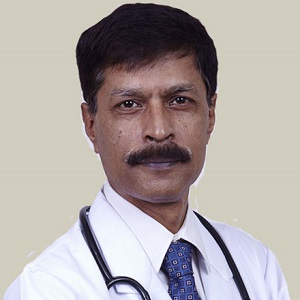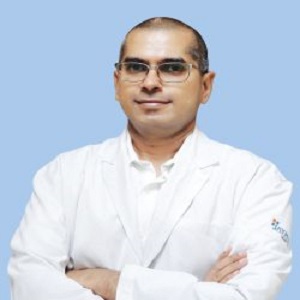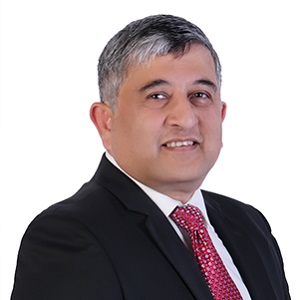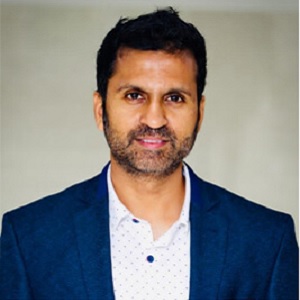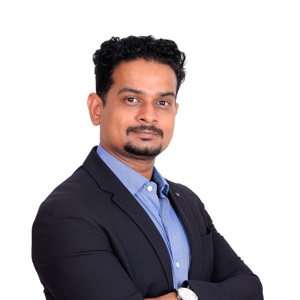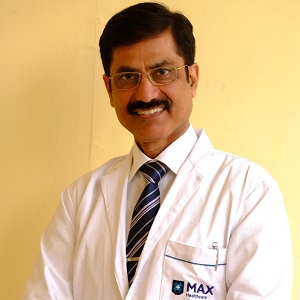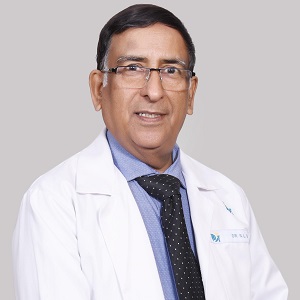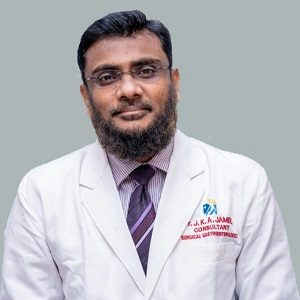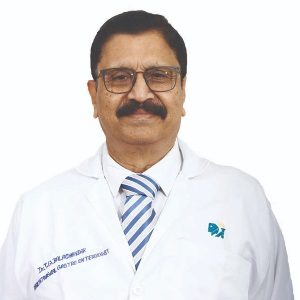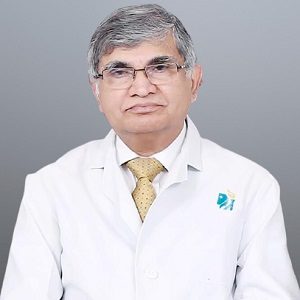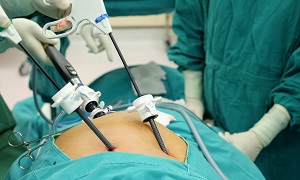Best Doctors in India for Splenectomy
- Liver Transplant Surgeon and HPB Surgeon, New Delhi, India
- Over 20 years’ experience
Profile Highlights:
- With over 20 years of experience in performing complex operations for cancer, and other diseases involving the pancreas, liver, and gall bladder, Dr. Anupam Saha has been the foremost gastro intestinal and Hepato-Pancreato-biliary surgeon of the Indian Armed Forces.
- He did a 1-year fellowship in Liver Transplantation as well, at King’s College Hospital, London.
- For his service, Dr. Anupam Saha has also been awarded the Vishist Sewa Medal by the Armed Forces.
- Liver Transplant Surgeon & HPB Surgeon, Noida, India
- Over 17 years’ experience
Profile Highlights:
- Dr. K R Vasudevan is a surgical gastroenterologist who has been trained at one of India’s best hospitals. Over a short span of 17 years, his career has progressed to the role of leading a team.
- He has established and sustained a liver transplant program at PSRI over the last few years. Due to his experience with over 1200 live donor liver transplants, he was selected for this role.
- HBP & Liver Transplant Surgeon, Bengaluru, India
- Over 35 years’ experience
Profile Highlights:
- Dr. Sanjay Govil is an accomplished HBP & Transplant Surgeon. He completed FRCS from the Royal College of Surgeons in England.
- He has achieved a few major accomplishments throughout his life as well, which include the First Liver Resection in Karnataka, in 2007, First Laparoscopic Liver Resection in a Cirrhotic Liver in Karnataka in the year 2008, First Laparoscopic Pancreatic duodenectomy in Karnataka in 2008, First ALPPS procedure in India in 2012 and several more.
- He trained in liver surgery and transplantation at Kings College Hospital in London, Queen Mary’s Hospital in Hong Kong, and the Graduate School of Medicine in Tokyo.
- Hepatologist & Gastroenterologist, Chennai, India
- Over 18 years’ experience
Profile Highlights:
- Dinesh Jothimani is a Hepatologist and Gastroenterologist with over 18 years of experience.
- He completed his MRCP (UK) from the Royal College of Physicians, London in 2004.
- Dr. Dinesh Jothimani is a liver specialist trained in the UK and Australia. He cares for his patients who suffer from liver diseases and performs skillful liver transplants.
- Senior Consultant - Hepatology and Liver Transplant, Mumbai, India
- Over 13 years’ experience
Profile Highlights:
- Dr. Uday Sanglodkar is a highly motivated and compassionate medical gastroenterologist with experience in hepatology/transplant hepatology.
- Dr. Uday Sanglodkar has vast experience in pre and post-liver transplant care, liver intensive care management, and evidence-based management of gastrointestinal and liver diseases.
- Dr. Sanglodkar is also an expert at diagnostic and therapeutic gastrointestinal endoscopy.
- Liver Transplant Surgeon, New Delhi, India
- Over 30 years’ experience
Profile Highlights:
- Dr. Sanjiv Saigal is a trained Hepatologist who has spearheaded the medical team of liver transplantation in the largest liver transplant program in India for over a decade
- Dr. Saigal is a bright name in the field of Gastroenterology and a famous liver transplant specialist with over 3400 successful Liver Transplants in his career.
- Medical Gastroenterologist, New Delhi, India
- Over 54 years’ experience
Profile Highlights:
- Dr. Sohan Lal Broor is a Gastroenterologist and has an experience of 54 years in this field. Dr. Broor practices at Indraprastha Apollo Hospitals in New Delhi.
- He completed MBBS from Panjab University in 1967, MD – Medicine from PGIMER, Chandigarh in 1972, and DM – Gastroenterology from PGIMER, Chandigarh in 1974.
- Dr. Sohan Lal Broor is a member of the 2-Year Fellowship in Gastroenterology at Medical College Of Wisconsin, Milwaukee, USA.
- Some of the services provided by Dr. Broor are Irritable Bowel Syndrome ( IBS ) Treatment, Peptic/ Gastric Ulcer Treatment, Inflammatory Bowel Disease (IBD) Treatment, Hemorrhoids Treatment, and Gastritis Treatment.
- Surgical Gastroenterologist, Chennai, India
- Over 22 years’ experience
Profile Highlights:
- Dr. Jameel is an internationally acclaimed GI and Minimal Access Surgeon from India with more than 22 years of experience.
- He underwent higher surgical training and Oncology research in Yorkshire. Dr. Jameel also did Robotic Surgical training at the University College Hospitals, London.
- Following his successful completion of training and obtaining CCT, he practiced at MidYorkshire Hospitals. In addition to consultation, he was an educational supervisor and provided surgical training to many surgeons.
- Surgical Gastroenterologist, Chennai, India
- Over 41 years’ experience
Profile Highlights:
- Dr. Bala Chandran T G is a veteran gastroenterologist with over 41 years of experience.
- Apart from completing his MBBS, MS, and MCh, he has done a fellowship from the Royal College of Surgeons of Edinburgh, the UK.
- He obtained training in laparoscopic techniques from Ethicon Endosurgery Institute, Mumbai.
- Dr. Bala Chandran T G has done much research, authored, and published several articles in many publications.
- Surgical Gastroenterologist, Chennai, India
- Over 48 years’ experience
Profile Highlights:
- Dr. Prasanna Kumar Reddy is a veteran gastroenterologist in Chennai.
- Along with MBBS and DNB in surgery, he has a Diploma in Laparoscopy from Strasbourg.
- Over the years, Dr. Prasanna Kumar Reddy has gained enough recognition and appraisals for his treatment methods and has become one of the most preferred doctors.
Best Hospitals in India for Splenectomy
Wockhardt Hospitals, Mumbai
- City: Mumbai, India
Hospital Highlights:
- Wockhardt Hospitals were established in the year 1973, originally called First Hospitals and Heart Institute.
- Wockhardt Hospitals are super specialty health care networks in India, nurtured by Wockhardt Ltd, India’s 5th largest Pharmaceutical and Healthcare company.
- Wockhardt Hospitals is associated with Partners Harvard Medical International, an international arm of Harvard Medical School, USA.
- Wockhardt Heart Hospital performed India’s first endoscopic heart surgery.
- The hospital has a state-of-the-art infrastructure equipped with the latest technologies and modern equipment.
- It has special Centers of Excellence dedicated to the major specialties to provide hassle-free and high-quality clinical care.
Pushpawati Singhania Hospital & Research Institute, New Delhi
- City: New Delhi, India
Hospital Highlights:
- Established in 1996, Pushpawati Singhania Research Institute is one of the top hospitals in the NCR region, as well as one of the top facilities in India for gastroenterology. The hospital is one of South Asia’s first institutes in medical and surgical treatment for diseases related to digestion.
- The hospital is equipped with state-of-the art facilities coupled with the latest equipment as well as renowned consultants from various parts of India as well as other parts of the world.
W Pratiksha Hospital, Gurgaon
- City: Gurugram, India
Hospital Highlights:
- W Pratiksha Hospital, Gurugram, is one of the best hospitals in the NCR region. It is also a top hospital in India for IVF. Since its inception, the hospital has performed over 5500 successful IVFs. The hospital also specializes in gynecology.
- With over 20 years of experience in providing quality healthcare, the hospital is known as one of the most trusted and valued health providers in India.
- Equipped with world-class medical facilities and advanced technology, the hospital’s doctors and clinicians also have a track record of delivering excellent results. The hospital is also known for focusing on preventive well-being as much as on curative treatment.
- The hospital has earned the trust of its patients, by providing the best available treatments at affordable costs.
Narayana Superspeciality Hospital, Gurugram
- City: Gurugram, India
Hospital Highlights:
- Situated near DLF Cyber City, Gurugram, Narayana Superspecialty Hospital is one of the top medical facilities in the Delhi NCR region, catering to the needs of the people. Known for its commitment to quality medical care and patient service, the hospital is a state-of-the-art facility with planned and well-equipped sections, which includes a spacious OPD area as well as comfortable patient rooms.
- It is the closest super-specialty hospital from Indira Gandhi International Airport towards Gurugram, and also the nearest super specialty hospital from DLF Cyber City. It is also close to major residential areas in Gurugram.
- It is part of the renowned Narayana Health Group. Established in 2000, by Dr. Devi Shetty, a renowned cardiac surgeon, it has grown to be one fo India’s leading healthcare groups.
Sir Ganga Ram Hospital, New Delhi
- City: New Delhi, India
Hospital Highlights:
- Sir Ganga Ram Hospital, New Delhi is known to provide the latest medical procedures with the latest technology in all of its units.
- The hospital has a team of reputed doctors, nurses, and healthcare professionals that ensure that patients receive quality care at affordable costs.
- Staffed with a team of highly qualified doctors, dedicated nurses, and paramedical and non-medical staff, the hospital aims to lead in healthcare delivery, medical education, training, and research.
- As per the vision of the founder, the hospital also provides free treatment to the economically weaker sections of society.
- Sir Ganga Ram Hospital also provides training to young doctors under the Diplomate in National Board(DNB) program. The DNB program at the hospital was started in 1984 and it is known for currently running the maximum number of DNB specialties in the country. It also has the distinction of having the first bone bank in India.
CK Birla Hospital, Gurugram
- City: Gurugram, India
Hospital Highlights:
- The CK Birla Hospital in Gurugram is a NABH-accredited multi-specialty hospital.
- The hospital strives to increase the quality of healthcare by focusing on UK NHS nurse and midwife training requirements. Policies and practices derived from the National Institute for Health and Treatment Excellence (NICE) recommendations in the United Kingdom ensuring that a strong focus on safety, high-quality clinical care, and sanitation is maintained.
- The hospital’s cutting-edge technology and facilities allow for real-time communication and seamless collaboration among caregivers, ensuring accuracy and the best possible results. Those with foreign experience and accreditations make up part of the hospital’s team of clinicians.
KIMS Hospital, Hyderabad
- City: Hyderabad, India
Hospital Highlights:
- KIMS Hospital (a brand name of Krishna Institute of Medical Sciences) is one of the largest and best multi-speciality hospitals in Hyderabad. The hospital provides various treatments to an enormous number of patients.
- The hospital has a capacity of more than 3000 beds. KIMS Hospitals offers different healthcare services in more than 25 specialities and super specialities.
- The hospital is equipped with modern medical equipment and technology. It has robotic equipment to provide minimal invasive techniques for patients.
- The hospital is aimed at providing world-class healthcare facilities and services at an affordable cost for patients.
- The various specialities and departments of the hospital include neurosciences, gastroenterology & hepatology, robotic science, reproductive sciences, dental science, oncological sciences, organ transplantation, heart and lung transplantation and mother and child care.
Fortis Hospital, Shalimar Bagh
- City: New Delhi, India
Hospital Highlights:
- Fortis Hospital in Shalimar Bagh is a multi-super specialty hospital that strives to provide world-class patient care by leaving no stone unturned.
- Fortis, Shalimar Bagh, with 262 beds and a 7.34-acre footprint, provides the best level of medical care through its team of doctors, nurses, technicians, and management professionals.
Reliance Hospital, Mumbai
- City: Mumbai, India
Hospital Highlights:
- Reliance Hospital is one of the best super-specialty care hospitals in Navi Mumbai.
- The main purpose of this hospital is to become a trustworthy place for the best health and hope for society. The hospital is well connected to the suburbs of Mumbai and Navi Mumbai.
- The hospital has various specialty departments, viz., Accident & Emergency, Anesthesiology, Dental Services, Dermatology, Diabetology, Dietetics Nutrition, Endocrinology, ENT, Gastroenterology, General Surgery, Gynaecology And Obstetrics, Hepato Pancreato Biliary Surgery, Infectious Disease, Internal Medicine, Interventional Radiology, Laboratory Medicine, Minimal Access Laparoscopic Surgery, Nephrology, Neurosciences, Opthalmology, Orthopaedics, Paediatrics, Pain Management Palliative Care, Physical Medicine Rehabilitation, Plastic And Reconstructive Surgery, Psychiatry, Pulmonary Medicine, Radiology, Rheumatology, Transplant, Urology Andrology, Vascular Surgery
Lilavati Hospital & Research Centre, Mumbai
- City: Mumbai, India
Hospital Highlights:
- Lilavati Hospital & Research Centre is India’s premier multi-speciality tertiary care hospital and has been recognised as a global medical excellence centre.
- Lilavati Hospital & Research Centre has built an unrivalled level of trust with its patients over the years, thanks to a solid foundation that comprises cutting-edge facilities, the best medical competence, research, education, and charity endeavours.
- The hospital is quite proud of the fact that it now serves patients from all kinds of backgrounds, not just from the United States but from all around the world.
- The hospital has a total of 323 beds, one of the largest Intensive Care Units (ICUs), 12 Operation Theatres with modern amenities, over 300 consultants, and almost 1,800 personnel.
Splenectomy
Splenectomy is a surgery for removing the entire spleen. The spleen is a delicate organ, which is about the size of your fist. It sits under the left rib cage near your stomach. This organ helps the body fight against infections, and it contains special white blood cells that can destroy bacteria. It helps in removing and filtering old red blood cells from the body’s circulation as well.
Generally, the most common reason for this procedure is for treating a ruptured spleen, which is generally caused by an abdominal injury. It is also used for treating other conditions which includes an enlarged spleen that might be causing discomfort as well as few blood disorders, a few infections, cancers and noncancerous tumors.
If only a part of the spleen is removed, then the procedure is termed as a partial splenectomy.
Purpose
Splenectomy is used for treating a wide variety of diseases and conditions. Your doctor might recommend this treatment for you if you suffer from any of the following:
Ruptured spleen- If a severe abdominal injury causes your spleen to rupture, this can lead to internal bleeding and life-threatening conditions.
Enlarged spleen- Splenectomy might also be done to ease the symptoms of an enlarged spleen, which leads to a feeling of pain and fullness.
Cancer– Cancers that are treatable with splenectomy include chronic lymphocytic leukemia, hairy cell leukemia, Hodgkin’s lymphoma and non-Hodgkin’s lymphoma.
Blood disorder- Blood disorders that are treatable with splenectomy include polycythemia vera, idiopathic thrombocytopenic purpura and thalassemia. However, splenectomy is usually recommended only if other treatments have failed to reduce the symptoms of these disorders.
Cyst or tumor- If noncancerous cysts or tumors inside the spleen become large, splenectomy might be required.
Infection- Sometimes, due to a severe infection or the development of a huge collection of pus surrounded by inflammation in your spleen, spleen removal might be required, if it doesn’t respond to other treatment.
Your doctor might also remove the spleen to help diagnose a condition. This is done when you have an enlarged spleen and he/she is unable to determine the reason.
Preparation
If your doctor finds that you are having a ruptured spleen and you show signs of massive bleeding or unstable vital signs like low blood pressure, you might need to go for spleen surgery right away.
In other cases, your doctor will require a complete physical exam, blood work and tests to look at your abdominal and chest area. The exact tests that you have will depend on your age and condition. The tests might also include an X-ray, MRI, electrocardiogram and CT scan.
You might need to follow a special liquid diet as well as take some medication so that you are able to clean out your bowels prior to your procedure. Avoid eating or drinking anything the morning of your surgery. You will receive proper instructions from your doctor.
Prior to the surgery, you will receive some drugs which will prevent bacterial infections from developing after the removal of the spleen. In some cases you might receive a vaccine.
Procedure
Right before your surgery is performed, you will be receiving a general anesthetic. The surgical team will be monitoring your blood pressure, heart rate and blood oxygen throughout the entire procedure. Heart monitors will be attached to your chest. There will also be a blood pressure cuff on your arm.
Once you are unconscious, your surgeon will begin the surgery using a minimally invasive procedure or open procedure. If your spleen is large, it is likely that your surgeon will choose to perform an open splenectomy.
Laparoscopic splenectomy
In laparoscopic splenectomy, the surgeon makes four small incisions in the abdomen. Then he/she inserts a tube equipped with a small video camera into the abdomen through one of the incisions. Your surgeon will then watch the video images on a monitor. Then the spleen will be removed with special surgical tools that are put in the other three incisions. After this is done, the incisions are closed.
Laparoscopic splenectomy is not suitable for everybody. Generally, in cases of a ruptured spleen, open splenectomy is required. Sometimes, a surgeon can start with a laparoscopic approach but later find it necessary to make a larger incision. This can be due to scar tissue from complications or any previous operation.
Open splenectomy
After the procedure
You will be moved to a recovery room after the procedure. If you undergo laparoscopic surgery, you might need to go home the same day or one day after. If you undergo open surgery, you might be able to go home after two to six days.
Talk to your doctor regarding how long you need to wait, resting at home until you can resume your daily activities. If you have had laparoscopic surgery, it might require two weeks. After open surgery, it might require around six weeks.
After the procedure, your other organs will take over most of the functions which were previously performed by your spleen. Although you still can be active without the organ, there is an increased risk of getting sick or any serious infection. This risk is usually the highest right after the surgery.
Risks
Although splenectomy is generally a safe procedure, it carries the risk of a few complications which include:
- Bleeding
- Infection
- Blood clots
- Injury to any nearby organ, which can include your stomach, pancreas and colon

